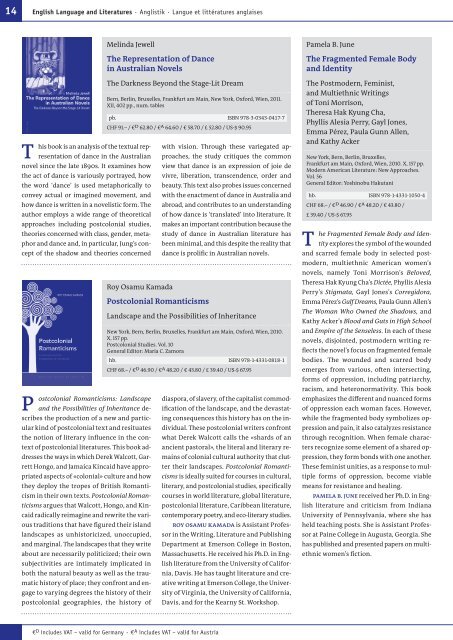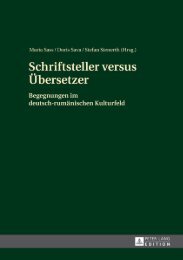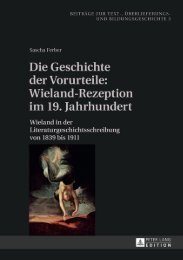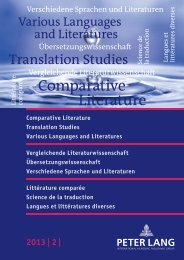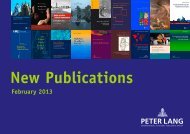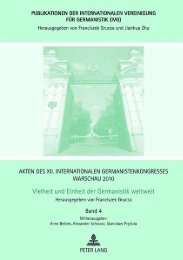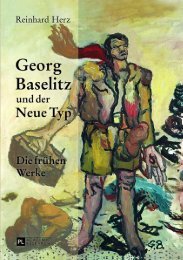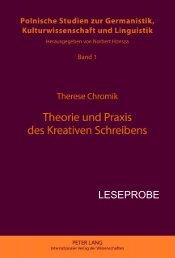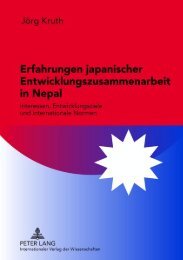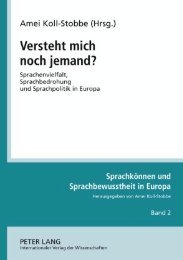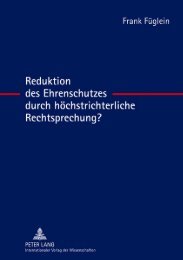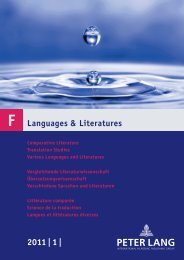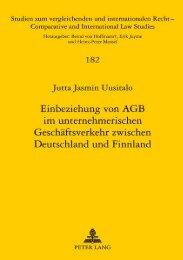Languages & Literatures 2011 | 1 | - Peter Lang
Languages & Literatures 2011 | 1 | - Peter Lang
Languages & Literatures 2011 | 1 | - Peter Lang
Create successful ePaper yourself
Turn your PDF publications into a flip-book with our unique Google optimized e-Paper software.
14 English <strong>Lang</strong>uage and <strong>Literatures</strong> · Anglistik · <strong>Lang</strong>ue et littératures anglaises<br />
T<br />
Melinda Jewell<br />
his book is an analysis of the textual representation<br />
of dance in the Australian<br />
novel since the late 1890s . It examines how<br />
the act of dance is variously portrayed, how<br />
the word ‘dance’ is used metaphorically to<br />
convey actual or imagined movement, and<br />
how dance is written in a novelistic form . The<br />
author employs a wide range of theoretical<br />
approaches including postcolonial studies,<br />
theories concerned with class, gender, metaphor<br />
and dance and, in particular, Jung’s concept<br />
of the shadow and theories concerned<br />
P<br />
The Representation of Dance<br />
in Australian Novels<br />
The Darkness Beyond the Stage-Lit Dream<br />
Bern, Berlin, Bruxelles, Frankfurt am Main, New York, Oxford, Wien, <strong>2011</strong> .<br />
XII, 402 pp ., num . tables<br />
pb . ISBN 978-3-0343-0417-7<br />
CHF 91 .– / € D 62 .80 / € A 64 .60 / € 58 .70 / £ 52 .80 / US-$ 90 .95<br />
Roy Osamu Kamada<br />
ostcolonial Romanticisms: Landscape<br />
and the Possibilities of Inheritance describes<br />
the production of a new and particular<br />
kind of postcolonial text and resituates<br />
the notion of literary influence in the context<br />
of postcolonial literatures . This book addresses<br />
the ways in which Derek Walcott, Garrett<br />
Hongo, and Jamaica Kincaid have appropriated<br />
aspects of «colonial» culture and how<br />
they deploy the tropes of British Romanticism<br />
in their own texts . Postcolonial Romanticisms<br />
argues that Walcott, Hongo, and Kincaid<br />
radically reimagine and rewrite the various<br />
traditions that have figured their island<br />
landscapes as unhistoricized, unoccupied,<br />
and marginal . The landscapes that they write<br />
about are necessarily politicized; their own<br />
subjectivities are intimately implicated in<br />
both the natural beauty as well as the traumatic<br />
history of place; they confront and engage<br />
to varying degrees the history of their<br />
postcolonial geographies, the history of<br />
Postcolonial Romanticisms<br />
Landscape and the Possibilities of Inheritance<br />
New York, Bern, Berlin, Bruxelles, Frankfurt am Main, Oxford, Wien, 2010 .<br />
X, 157 pp .<br />
Postcolonial Studies . Vol . 10<br />
General Editor: Maria C . Zamora<br />
hb . ISBN 978-1-4331-0818-1<br />
CHF 68 .– / € D 46 .90 / € A 48 .20 / € 43 .80 / £ 39 .40 / US-$ 67 .95<br />
€ D includes VAT – valid for Germany · € A includes VAT – valid for Austria<br />
with vision . Through these variegated approaches,<br />
the study critiques the common<br />
view that dance is an expression of joie de<br />
vivre, liberation, transcendence, order and<br />
beauty . This text also probes issues concerned<br />
with the enactment of dance in Australia and<br />
abroad, and contributes to an understanding<br />
of how dance is ‘translated’ into literature . It<br />
makes an important contribution because the<br />
study of dance in Australian literature has<br />
been minimal, and this despite the reality that<br />
dance is prolific in Australian novels .<br />
diaspora, of slavery, of the capitalist commod-<br />
ification of the landscape, and the devastat-<br />
ing consequences this history has on the in-<br />
dividual . These postcolonial writers confront<br />
what Derek Walcott calls the «shards of an<br />
ancient pastoral», the literal and literary remains<br />
of colonial cultural authority that clutter<br />
their landscapes . Postcolonial Romanticisms<br />
is ideally suited for courses in cultural,<br />
literary, and postcolonial studies, specifically<br />
courses in world literature, global literature,<br />
postcolonial literature, Caribbean literature,<br />
contemporary poetry, and eco-literary studies .<br />
Roy oSaMu KaMada is Assistant Professor<br />
in the Writing, Literature and Publishing<br />
Department at Emerson College in Boston,<br />
Massachusetts . He received his Ph .D . in English<br />
literature from the University of California,<br />
Davis . He has taught literature and creative<br />
writing at Emerson College, the University<br />
of Virginia, the University of California,<br />
Davis, and for the Kearny St . Workshop .<br />
Pamela B . June<br />
The Fragmented Female Body<br />
and Identity<br />
The Postmodern, Feminist,<br />
and Multiethnic Writings<br />
of Toni Morrison,<br />
Theresa Hak Kyung Cha,<br />
Phyllis Alesia Perry, Gayl Jones,<br />
Emma Pérez, Paula Gunn Allen,<br />
and Kathy Acker<br />
New York, Bern, Berlin, Bruxelles,<br />
Frankfurt am Main, Oxford, Wien, 2010 . X, 157 pp .<br />
Modern American Literature: New Approaches .<br />
Vol . 56<br />
General Editor: Yoshinobu Hakutani<br />
hb . ISBN 978-1-4331-1050-4<br />
CHF 68 .– / € D 46 .90 / € A 48 .20 / € 43 .80 /<br />
£ 39 .40 / US-$ 67 .95<br />
T<br />
he Fragmented Female Body and Identity<br />
explores the symbol of the wounded<br />
and scarred female body in selected postmodern,<br />
multiethnic American women’s<br />
novels, namely Toni Morrison’s Beloved,<br />
Theresa Hak Kyung Cha’s Dictée, Phyllis Alesia<br />
Perry’s Stigmata, Gayl Jones’s Corregidora,<br />
Emma Pérez’s Gulf Dreams, Paula Gunn Allen’s<br />
The Woman Who Owned the Shadows, and<br />
Kathy Acker’s Blood and Guts in High School<br />
and Empire of the Senseless. In each of these<br />
novels, disjointed, postmodern writing reflects<br />
the novel’s focus on fragmented female<br />
bodies . The wounded and scarred body<br />
emerges from various, often intersecting,<br />
forms of oppression, including patriarchy,<br />
racism, and heteronormativity . This book<br />
emphasizes the different and nuanced forms<br />
of oppression each woman faces . However,<br />
while the fragmented body symbolizes oppression<br />
and pain, it also catalyzes resistance<br />
through recognition . When female characters<br />
recognize some element of a shared oppression,<br />
they form bonds with one another .<br />
These feminist unities, as a response to multiple<br />
forms of oppression, become viable<br />
means for resistance and healing .<br />
PaMela B. June received her Ph .D . in English<br />
literature and criticism from Indiana<br />
University of Pennsylvania, where she has<br />
held teaching posts . She is Assistant Professor<br />
at Paine College in Augusta, Georgia . She<br />
has published and presented papers on multiethnic<br />
women’s fiction .


